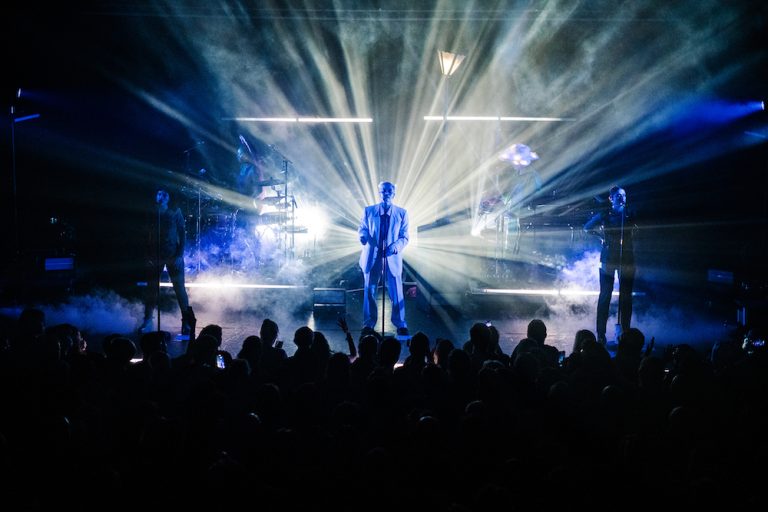During Easter Weekend, Beats Per Minute hopped into the rabbit hole that is The Hague’s science fair for music & audiovisual art.
No matter which way you engage Rewire Festival, this event – as the name blatantly underscores – always leaves visitors with an abundance of narrative threads to untangle. For those not so well-versed in avantgarde-speak, this can be a wee bit daunting task. But to be fair, Rewire unravels these academic manifestos with such Doc Brown-esque brio, you find yourself altruistically lining up to the festival’s impressive buffet of pioneering performances and curated events.
So you ask yourself on this fateful Easter weekend, the age old ‘what came first, the egg or the chicken?’ question. And before you realize it, your brain’s neurons are firing on all cylinders, working up a storm of illumination. In yeoman’s terms, Rewire isn’t all that different from hunting easter eggs in the backyard. You just need to find the narrative that suits you best – and it’s one you usually stumble upon by plunging into the programme blindly.
As it turned out, the narrative that highlighted during my own festival experience corresponded closely to the festival’s big flagship thread this year, entitled Inter/relations. Meaning that many performances revolve around the notion of correspondence and relatability, whether its immediate improvisation – for example Cairo psych jam druids Dwarfs of East Agouza – or exchanges over a longer period of time, which is more or less the gist of Patti Smith’s high profile project with Soundwalk Collective.
The first show I witnessed that really hinged into that idea was Enxin / Onyx, a joint project by group A’s Tommi Tokyo and Hiro Kone’s Nicky Mao. Their show unraveled in The Hague’s murky DIY venue The Grey Space In The Middle, which served as the festival’s de facto stronghold. The basement venue is indeed amazing: it’s got an iffy PA (plus a shot speaker blasting your poor ears right at the entrance), too much smoke and an uncomfortably low ceiling, so you can barely see what the fuck is going on. In other words; all the intangibles of what a great basement show should entail.
It works wonders in conjunction with Enxin / Onyx’s pixelated noise hexes, which sounded more like Sunn O)))-esque drone metal at times than the abstract glitch-tronica we’ve come to expect from Tokyo and Mao’s separate avenues. This feral intensity seemed to carry over physically. Some audience members actually started to tremble within the ear-piercing cascades of sound, as if under some kind of tantric spell. This in contrast to Tokyo and Mao’s stage demeanor was lowkey hilarious, as you could frequently catch them staring at each other with an impish grin plastered on their face.
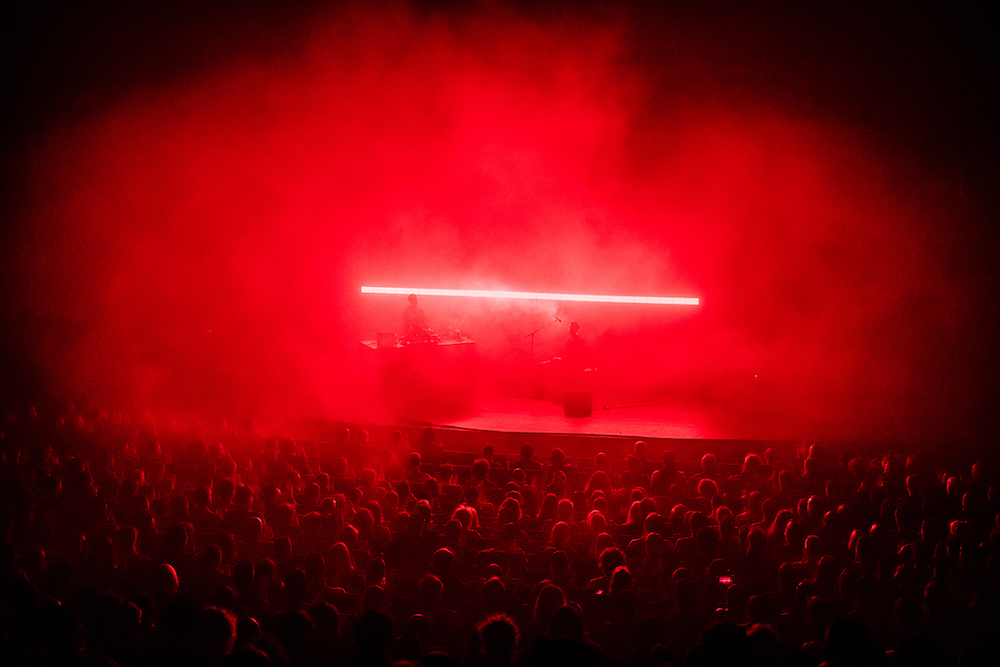
Those well-acquainted with the Rewire-ethos know it’s all about exploring the extremes. And as far as extremes go, nothing beats hopping from Grey Space’s gritty subterranean dungeon to the hyper-modern, post-brutalist firmament of Amare. This state-of-the-art labyrinthine concert hall isn’t exactly conservative; it looks like the secret lair of a Bond villain, complete with staff dressed in orange uniforms. If Stanley Kubrick were alive, it would become one of his iconic set locations.
During the festival, the building was scattered with installations curated by satellite event Proximity Music, all of which seemingly related to the corporeal. Israeli artist Amos Peled turned the ultrasound on himself to create nifty noisescapes under the name Phantom Limb, whereas Matteo Marangoni & Dieter Vandoren created a bunch of sound drones in the yard surrounding Nieuwe Kerk, all chirping within their unique frequency like a swarm of crickets. To quote the late legend Ryuichi Sakamoto: “The key concept is to open your ears. Music can be here and there, anywhere surrounding you.”
Suffice it to say, the pairing of Amare’s discombobulating interior with the razzle-dazzle premise of Rewire is, well, simpatico. Amare’s main venue, a big theater hall – with all its Wagnerian depth and scale – is the place where you should allow artists to indulge their deepest ambitions without restraint, something Rewire has been reputed to provide. Last year, Caterina Barbieri cashed in on that and then some, churning out one of the most visually stunning performances in recent memory.
The prospect of Canadian ambient deep diver Tim Hecker and Vincent de Belleval – who specializes in cutting edge stage light designs – at this stage and this slot, well, that’s a tantalizing prospect indeed. Unfortunately, on Sunday, the returns were pretty lame, with an interactive LED-bar at the length of the stage. Something like this could work with more visceral performers – like frequent collaborator Arca – but under the backdrop of Hecker’s sonorous sound movements, this falls short of what it could be. It doesn’t help that we’ve heard more inspiring material come from Hecker in the past. All in all, this feels like a missed opportunity.
No, the collaboration between Nadah El Shazly and Elvin Brandhi at Korzo on Saturday was a lot more thrilling. Like Enxin / Onyx, these two shrewd experimentalists faced each other in sort of a Fuck Buttons-esque set-up, skirmishing with snarling and theatrical movements. It isn’t exactly West Side Story, but El Shazly – who is also an actress – and Brandhi definitely lean into the theatrical element.
The performance was billed as sort of a deconstruction of opera music, but in a brief conversation with El Shazly, a projection screen of visuals that provided more context couldn’t be attained. Never mind: witnessing Brandhi and El Shazly duke it out in boisterous fashion was fun enough as it is. They deliberately use noise and unmelodic vocal calisthenics as building blocks to create a – dare-I-say – pop performance, just to see if they can. And though both artists appear to be clashing sonically, they’re covertly leaning into each other’s strengths. El Shazly as a world-class vocalist and producer, Brandhi as a restless alchemist of sound.
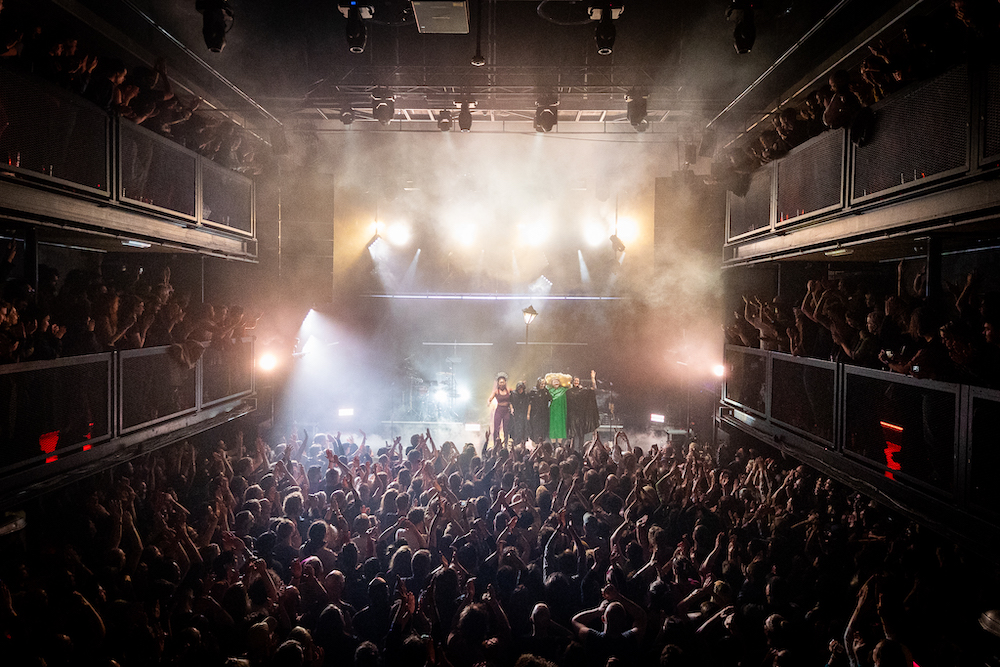
If anyone knows a thing or two about bending image and sound towards positive radicalism, it’s Fever Ray’s Karin Dreijer. Throughout three albums – 2009’s self titled debut, 2017’s Plunge and this year’s masterpiece Radical Romantics – the project serves as a musical funhouse mirror that reflects themes of sexuality, identity and relationships with an inquisitive whimsy. To underpin the ‘radical’ part of romanticism: Dreijer’s show at Rewire isn’t as big of a stylistic leap from the live shows of her debut up to Plunge. Those formative first Fever Show-performances formed an intriguing shadowplay. You could barely make out anything apart from the silhouettes and rustic bedroom lamps gracing the stage. The odd laser wasn’t implemented in a pageant sort of way: it represented a narrow light source from a solitary peephole.
Those shows felt like a self-imposed, defeatist isolation, with coils of desire and dark impulse entangling like electric cables. “I live between concrete walls/ In my arms she was so warm/ Oh how I try/ I leave the TV on/ And the radio,” Dreijer sang with a foreboding vocoder effect on the lurching “Concrete Walls”. Though Dreijer’s other high profile outfit The Knife is presented as a separate thing, it feels super wrong not to mention those groundbreaking Shaking The Habitual shell games as part of Fever Ray’s evolution towards their more extroverted recent musical output. It further reimagined what a live show could entail: how the power of imagination holds greater merit than adhering to traditional performance.
The logical outcome were those boisterous obtuse Plunge-shows in which Dreijer explored all the outrageousness and obscenities behind decadent hedonism, complete with padded muscle suits and band members dressed as Vegas strippers and walkway starlets on limo benders. The setting for tonight’s Fever Ray show almost represents the big comedown from that brouhaha. There’s a lone lamppost for lovelorn philanderers to swing across. One of the band members is actually wearing a thundercloud as a headdress: such a fun, cheeky play on the cinematic cliche that stormy weather happens when your heart gets rejected. And how about Dreijer: they have slithered into the persona of the hopeless office clerk in search for that elusive spark amidst the drudgery.
Dreijer’s gift for visual storytelling in a live show is unparalleled, as this setting perfectly mirrors the narrative threads on Radical Romantics. If Plunge was about sexual liberation and joy, this set leans on resilience and illumination, avidly seeking for forms of love that aren’t upended by self-destruction or cynicism. Tonight’s show culminates the secret wishing and hoping of the early work with the inflamed passion of Plunge, coalescing and fermenting those sensibilities into a more focussed, inspired expression of love, one that wards off sorrow and negativity like a shield. It’s like In The Wee Small Hours meets Beetlejuice meets Office Space and it’s fucking glorious.

Though less subtle and brilliant, the stage debut of Alto Arc – the unruly supergroup formed by hyperpop-honcho Danny L Harle, Deafheaven’s George Clarke, Hundred Waters’ Trayer Tryon and visual artist Isamaya Ffrench – did quite literally bring out the proverbial fireworks in a major way. This wasn’t so much a concert as it was some kind of lost stage play Anne Rice could have penned back in the day. Fake blood is spilled, winged renaissance dresses are donned, oh my word. At a festival that compulsively chin-strokes at everything, it’s welcoming to see such a mirthful display of horror camp shift the vibe to collective bemusement.
Not to overshadow the visual spectacle, Alto Arc’s music packs a lot of punch: a hard-hitting bricolage of industrial, deconstructed EDM, black metal and trip hop. The whole thing ends in poetically Biblical fashion – it is Easter after all – as the performers shove Clarke in an electric chair prop and pull the lever in fierce retribution. You can attach any sort of bullshit allegory to this: a reckoning with toxic masculinity, or the cycle of life and death. But as a stagehand clumsily wheels Clarke – still wrapped in white rags like a mummy – off stage, it’s hard to ingest a loud cackle. Jesus fuckin’ wept.
Ale Hop’s previous Rewire performance at Korzo – during the 2021 lockdown edition – was just as stormy, but as an honorary member of The Paper Ensemble, quietude is embraced. The project, led by Amsterdam-based artists Jochem van Tol and Ibelisse Guardia Ferragutti, doesn’t employ quietude in the tranquil sense, however. By letting the crackling of paper sculptures and subtle, low frequency synth drones, drums and percussion dictate the acoustics, the audience is subjected to more taut, acute courting of near-silence. By all means, it should look ridiculous seeing performers mess around with these big paper sculptures with a straight face, but the pervading emotion I felt was vigilance and caution – that queasy feeling before a big jump scare.
As stated before, a fair chunk of this year’s Rewire performances revolve around correspondence and interaction. It’s fun to witness this phenomenon unfold in all these bafflingly different ways. At PAARD II, SFX stalwarts Zoë McPherson & Alessandra Leone were one-upping each other climax over climax with fist-pumping death-or-glory euphoria. That same venue on Sunday saw Church Andrews & Matt Davies keep time with each other; synths and live drums boxed into each other with brainy, mathematical fortitude, composing electronic pop like they are the protagonists of Primer.
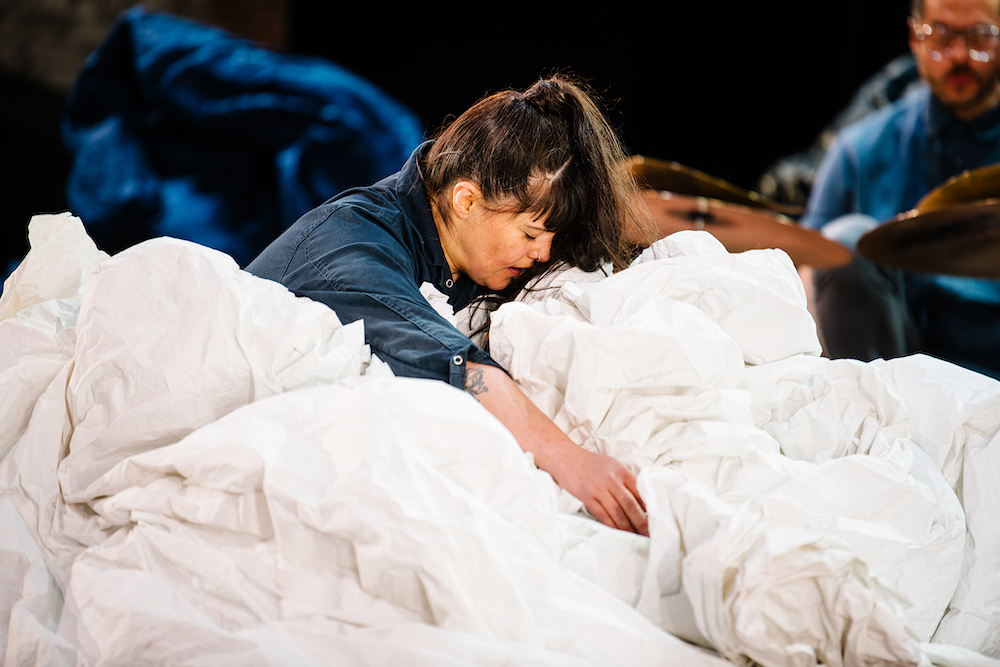
One of the festival’s definitive highlights was undoubtedly Egypt’s Dwarfs of East Agouza, who rival the great Wolf Eyes as tried-and-true noise psych outlaws. Their show at the always charming Koorenhuis had everything: volatile, industrial-laced sound vortexes that rival Neubauten or Lou Reed’s Metal Machine Music. Halfway through they clowned around with poetic non-sequiturs and frolicking free-jazz tumbling-about, reminiscent of The Ex. Where a lot of Rewire performances court some form of discord or clash, The Dwarfs are an impeccable exercise of chemistry between Maurice Louca, Alan Bishop and Sam Shalabi. By now, you could call it a psychic connection even; all those baffled smiles spotted within the audience say everything about how much of a sure thing Dwarfs of East Agouza are.
More traditional trysts between audience and performer did offer mixed results at this year’s Rewire. Dawuna – who got a nice slot at Amare’s smaller venue on Sunday – leaned further into his reputation as a shy performer, with faint appendages of songs emerging from warm, soul-laced tapestries of sound. Coby Sey – one of the highlights on last year’s Rewire – was stretched a bit thin at PAARD’s main venue, something a throbbing rendition of Seal’s “Kiss From A Rose” couldn’t salvage. At his best, Sey proved his mettle as one of the planet’s most attentive sculptors of modern, minimal pop.
Dreamcrusher’s show at Grey Space on Friday had no problem mending the chasm between onlookers. See that’s the great thing about basement shows, it’s impossible not to engage in some intrusive way, especially when the music sounds as harsh and unrelenting as the New York-based artist’s. Like with Nadah El Shazly & Elvin Brandhi’s performance, Dreamcrusher wields heavy noise with a pop musician’s charisma, which – contrived or not – yields moments of odd beauty. This “Nihilist queer revolt musik” as they coined it, really does a number on the Grey Space, as they immediately voice their displeasure for “stiff audiences”. It’s move or be moved, and – as far as moments of unexpected beauty go – the returns do not disappoint. For one, I’ve never been at a noisy basement show that ends in a goddamn sit down.
At Paard, Coucou Chloe didn’t complicate things, firing off twisted club bangers with the ennui of a party crasher who left the keys in the car, forcing them to stick around a little longer. Nevertheless, the audience eats it up with religious fervor. Zebra Katz – dressed in Roman rubber top (with bat nipples!) – takes on a different approach to rile up the crowd into a frenzy, frequently engaging in witty repartee and call-and response. It was likely the most unabashedly entertaining show – without too much intellectual subtext – as Katz capped the rest of his slot in the middle of the crowd.
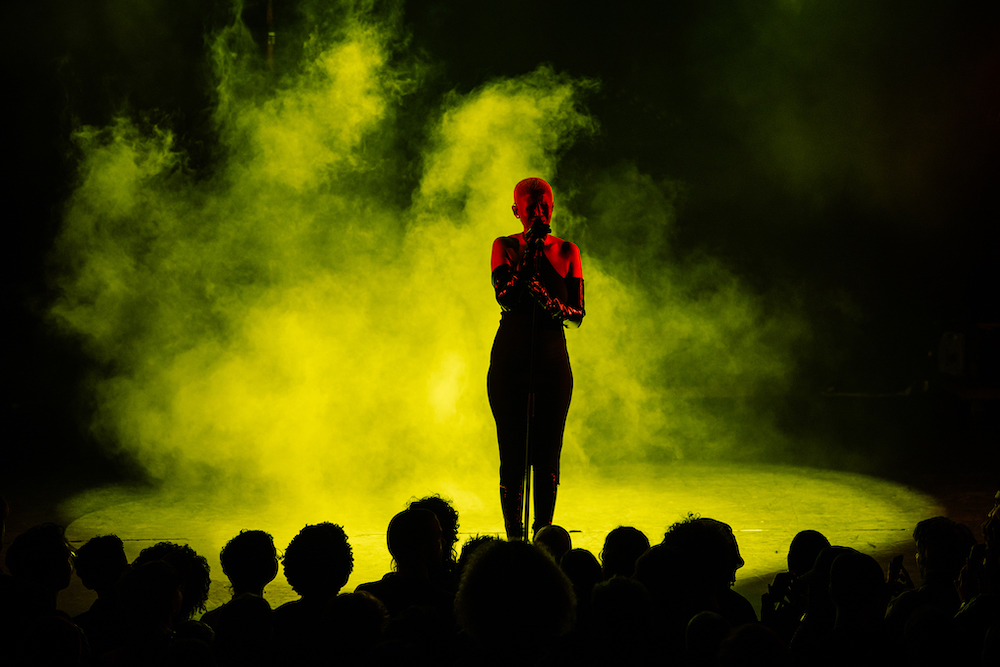
It paved the way properly for this year’s closing headliner Kelela, where the myriad of Rewire’s loose narratives braid together into a single crystallized unit. Swerving on stage in a glimmering lounge dress and long gloves, she professes to the crowd that her show doesn’t involve some kind of visual extravaganza. She likens her appearance at PAARD to “a house party with live vocals”, in her own words. Where most headliners would probably pull out all the stops – especially at a festival like Rewire that often grants ambitious artists carte blanche to take big risks – Kelela opts for a subdued sultry approach in voice and demeanor, with songs all addressing some element of disharmony: missed calls, fading liaisons, unrequited advances.
But rather than letting the listeners loose on a pre-constructed maze, her songs lift them skyward to beholden that big bird eye’s view. It’s as if watching all that intertwining electricity unfetter into a calm canopy of lights. More elementary in its execution than Fever Ray perhaps, but it all boils down to the same basic promise, that love is always somewhere adrift in the air, or hiding in the wire… an untapped husk waiting to be replenished. Indeed, Kelela’s set marks a final outward sigh of relief for a Rewire festival rife with tension and release. For all intents and purposes, we made contact – and that’s an epiphany worth luxuriating in every now and then. Especially when it comes to feeling love.
All photos by Parcifal Werkman.

